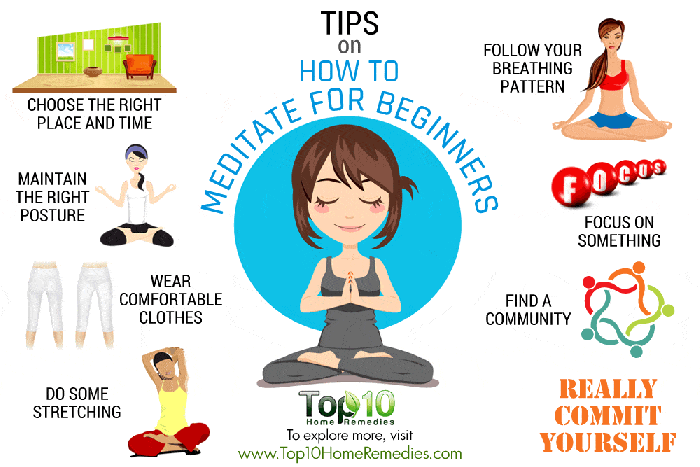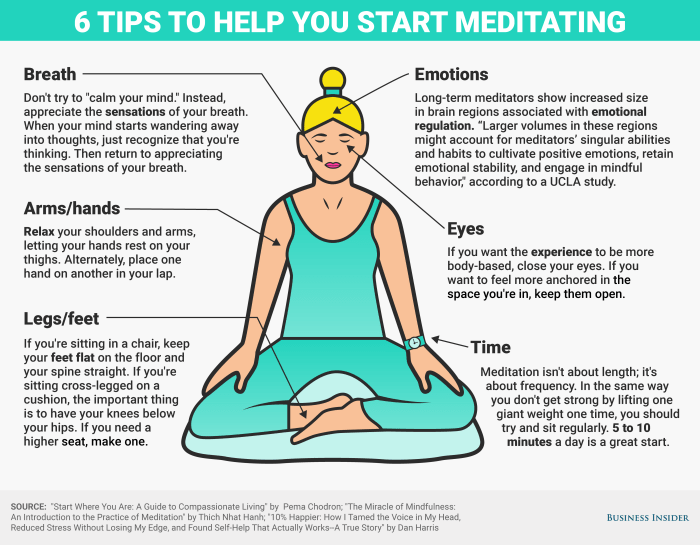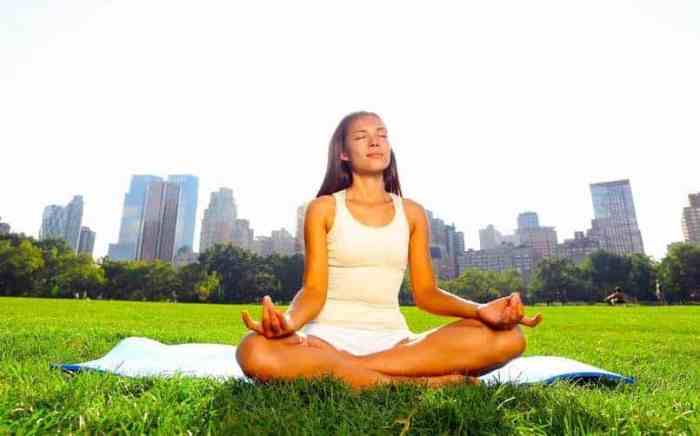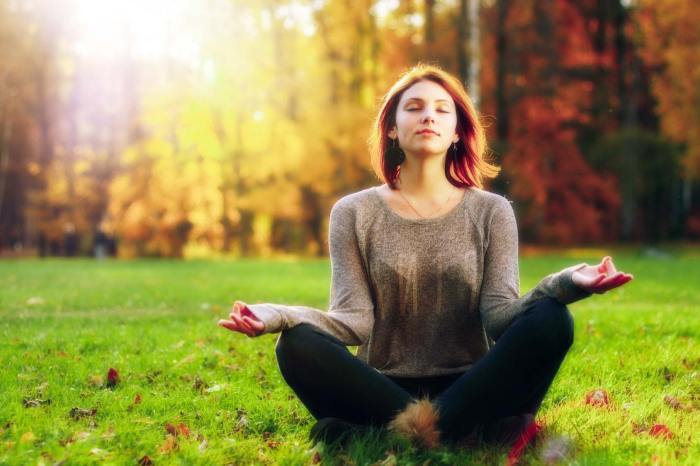20 Ways to Meditate More Effectively sets the stage for this enthralling narrative, offering readers a glimpse into a story that is rich in detail with refreshing subuh lecture style and brimming with originality from the outset.
Embark on a journey through different meditation techniques, breathing exercises, creating a peaceful space, and incorporating movement for a holistic approach to well-being.
Importance of Effective Meditation Techniques

Effective meditation techniques play a crucial role in enhancing overall well-being. By practicing meditation effectively, individuals can experience a wide range of benefits that positively impact their mental and physical health.
Improved Focus and Reduced Stress
- Effective meditation techniques help individuals improve their focus and concentration by training the mind to stay present and attentive.
- Through regular practice of meditation, individuals can learn to manage stress more effectively, leading to a calmer and more balanced state of mind.
- Meditation allows individuals to cultivate mindfulness, which helps in reducing anxiety and promoting a sense of inner peace.
Impact on Mental Health
- Regular meditation has been linked to improved mental health outcomes, including reduced symptoms of depression and anxiety.
- Meditation can enhance self-awareness and emotional regulation, providing individuals with tools to navigate challenging emotions and situations.
- By incorporating effective meditation techniques into their daily routine, individuals can experience greater mental clarity and overall well-being.
Different Types of Meditation Practices: 20 Ways To Meditate More Effectively

Meditation practices come in various forms, each offering unique benefits for the mind, body, and soul. Understanding the differences between these types can help you choose the right practice that suits your needs and lifestyle.
Mindfulness Meditation
- Mindfulness meditation involves focusing on the present moment without judgment, allowing thoughts and emotions to pass without attachment.
- Benefits include stress reduction, improved concentration, and increased self-awareness.
Loving-Kindness Meditation
- Loving-kindness meditation focuses on cultivating feelings of love, compassion, and kindness towards oneself and others.
- Practicing loving-kindness meditation can enhance empathy, improve relationships, and foster emotional healing.
Transcendental Meditation
- Transcendental meditation involves silently repeating a mantra to achieve a state of relaxed awareness.
- Benefits may include reduced anxiety, improved creativity, and a deeper sense of inner peace.
Active vs. Passive Meditation Techniques
Active meditation techniques involve movement or activity during the practice, such as walking meditation or yoga. On the other hand, passive meditation techniques require stillness and focus, like breath awareness or body scan meditation.Active techniques can help release physical tension, improve circulation, and promote mindfulness in motion. Passive techniques, on the other hand, may deepen relaxation, enhance mental clarity, and cultivate inner peace.Each type of meditation practice offers a unique approach to cultivating mindfulness, emotional well-being, and spiritual growth.
By exploring different techniques, you can find a practice that resonates with you and supports your overall health and happiness.
Setting Up a Comfortable Meditation Space
Creating a peaceful and comfortable meditation space at home is crucial for enhancing the effectiveness of your practice. Your meditation space should be a sanctuary where you can fully immerse yourself in the present moment without distractions.
Tips for Creating a Peaceful Meditation Space, 20 Ways to Meditate More Effectively
- Choose a quiet area in your home where you won’t be disturbed.
- Ensure good lighting, either natural or soft artificial light, to create a calming atmosphere.
- Select a comfortable cushion or chair to sit on during meditation to avoid discomfort.
- Add elements like candles, essential oils, or incense to enhance relaxation and focus.
Importance of Decluttering and Organizing Your Space
Decluttering and organizing your meditation space can significantly impact your ability to focus and be mindful during your practice. A clean and tidy space helps clear your mind and eliminate distractions, allowing you to fully engage with your meditation without external interference.
Breathing Techniques for Meditation

Proper breathing techniques play a crucial role in enhancing the effectiveness of meditation. By focusing on the breath, we can calm the mind, improve concentration, and deepen our practice.
Diaphragmatic Breathing
- Also known as deep belly breathing, diaphragmatic breathing involves breathing deeply into the abdomen rather than the chest.
- Start by inhaling deeply through your nose, allowing your belly to rise as you fill your lungs with air.
- Exhale slowly through your mouth, feeling your belly fall as you release the breath.
- Repeat this process, focusing on the sensation of the breath moving in and out of your body.
Alternate Nostril Breathing
- This breathing exercise is a technique from yoga that helps balance the left and right sides of the brain.
- Start by closing your right nostril with your thumb and inhaling deeply through your left nostril.
- Then, close your left nostril with your ring finger and exhale through your right nostril.
- Inhale through the right nostril, close it with your thumb, and exhale through the left nostril.
- Repeat this pattern, focusing on the breath and the sensation of air passing through each nostril.
Benefits of Incorporating Breathwork
- By incorporating breathwork into your meditation practice, you can deepen your awareness of the present moment.
- Proper breathing techniques can help reduce stress, anxiety, and promote relaxation.
- Focusing on the breath can also improve your ability to concentrate and stay grounded during meditation.
- Experiment with different breathing exercises to find what works best for you and enhances your meditation experience.
Utilizing Meditation Apps and Guided Meditations

In today’s digital age, meditation apps have become increasingly popular tools for both beginners and experienced practitioners to enhance their meditation practice. These apps offer a wide range of guided meditations and features that can help users stay focused, relaxed, and motivated.
Popular Meditation Apps for Beginners and Experienced Practitioners
- Headspace: Known for its user-friendly interface and a variety of guided meditations for different purposes such as stress relief, sleep, and focus.
- Calm: Offers guided meditations, relaxing music, sleep stories, and breathing exercises to help users unwind and improve their mental well-being.
- Insight Timer: Provides a vast library of guided meditations led by experienced teachers and practitioners from around the world, catering to various meditation styles and preferences.
Benefits of Guided Meditations
- Enhancing Focus: Guided meditations can help individuals stay focused on the present moment by following the instructions provided by the meditation teacher.
- Promoting Relaxation: By listening to calming voices and soothing music, guided meditations can induce a state of relaxation and reduce stress levels effectively.
- Building Consistency: Guided meditations can assist in developing a consistent meditation practice, especially for beginners who may find it challenging to meditate on their own.
Personal Experiences with Using Meditation Apps
Throughout my meditation journey, I have found meditation apps to be incredibly helpful in staying committed to my daily practice. The variety of guided meditations available has allowed me to explore different techniques and find what works best for me. With the convenience of having guided sessions at my fingertips, I have been able to maintain a consistent meditation routine and experience the numerous benefits of mindfulness and relaxation in my daily life.
Incorporating Movement into Meditation
When it comes to meditation, many people think of sitting still in silence. However, incorporating movement into meditation can be a powerful way to deepen your practice and enhance mindfulness. By engaging in movement-based meditation practices like yoga and Tai Chi, you can improve your mind-body connection and promote a sense of inner calm.
Benefits of Movement-Based Meditation
- Improved Mindfulness: Movement-based meditation practices help you become more aware of your body and breath, enhancing your overall mindfulness.
- Physical and Mental Relaxation: The combination of gentle movements and focused breathing can help release tension in both the body and mind, leading to a state of deep relaxation.
- Enhanced Well-Being: By incorporating movement into your meditation practice, you can take a holistic approach to your well-being, nurturing both your physical and mental health.
Final Review

In conclusion, by implementing these 20 ways to meditate more effectively, you can transform your practice and experience profound benefits for your mind, body, and soul. Start your meditation journey today and reap the rewards of a calmer, more focused life.